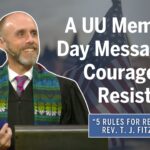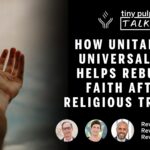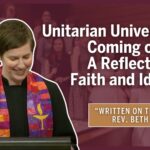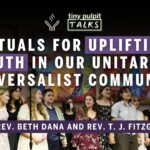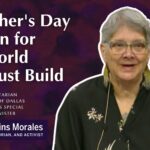Luminaries of Truth and Justice: How to Be a Radical | Rev. Dr. Daniel Kanter | 09.15.2024
Sermon Transcript:
Well, in 1971, a book by American community activist and writer, Saul Alinsky, about how to successfully run a movement for change was published. It was called Rules for Radicals. In it, he said, “Rule number one, power is not only what you have, but what an opponent thinks you have.” Rule number four said, “Make opponents live up to their own book of rules.” And rule number nine said, “The threat is more terrifying than the thing itself.” There are more, they’re not bad, not too bad, rules to make things change in the world. I like a set of rules. I like a set of rules to live by, to navigate the murky waters of trying to change something. But you know what I like better? I like examples. Examples of people who made things happen can be instructive to me, knowing they don’t always live up to all our expectations, but they get stuff done.
This is what we’re doing in this sermon series, Luminaries of Truth and Justice in the Keeping the Flame theme year. You’ve got the reference, right? Luminaries, flame. We’re clever. We’re clever. I know.
One who stands out to me, one luminary is not your typical bomb throwing sign, carrying movement, organizing radical, but a 19th century nerd Unitarian minister whose brilliance remains in the words we say about justice today. He coined the phrase we all know that was on Obama’s rug in the Oval Office about the arc of the moral universe bending toward justice. What he actually said was in a sermon he gave sometime in the 1800s, which he preached, I quote, “I do not pretend to understand the moral universe. The arc is a long one. My eye reaches but little ways. I cannot calculate the curve and complete the figure by the experience of sight. I can divine it by conscience. And from what I see, I am sure it bends toward justice.”
His name was Theodore Parker. Parker was a Unitarian minister. He was outspoken. He was not diplomatic. He did not do things to be liked, but he was hugely impactful in his time. He was born in Lexington, Massachusetts in 1810, the youngest of 11 children. His grandfather had fought at the Battle of Lexington. His family were farmers. Theodore started reading early, and by age nine, he was reading Greek philosophy. By the time he was in his 20s, he owned 14,000 books. His friends swore he knew every word in them. By the time he was 25, he could read in 20 languages. He was a teacher at age 16 and then a Harvard grad and then a Harvard Divinity school grad, and he was ordained and settled in 1837 at a small Unitarian parish in West Roxbury, Massachusetts, just outside of Boston.
Parker was a scholar and a writer, a preacher of critical thinking to the thousands who would come to hear him. He was one of the first American clergymen to endorse women’s suffrage, and he was one of the first to refer to God as both father and mother. He became the intellectual leader of the anti-slavery movement opposed to the pro-slavery Mexican war, and he took charge of the Boston movement to rescue fugitive slaves. He led the American religious movement to claim Jesus as a man, saying that Jesus’s miracles broke with the natural laws set in motion by God, and so he asked, “Why would God intervene and break those natural laws to get people just to believe in Jesus?” This didn’t make sense to him. He said, “God intervened in the spiritual world, not the natural world. God intervened in your heart speaking directly to you, not through scriptures. God is a part of your mind and consciousness, not an alien presence, but something you are born with and know without having to declare your allegiance to that God.”
He challenged factual accuracy of the Bible as a form of idolatry and an obstacle to the development of the soul. He said, “You would love the Bible better if you did not worship it,” and so he said, “Our religious goal was to live up to God’s love and do justice in the world.”
Parker is famous for his sermon on what he called the transient and the permanent, the transient being how we express religion while the permanent is the thing that moves within us that proves what is true, what is the capacity to hear and feel the divine and have the intuitive grasp of what is moral. Parker said, “Christianity is transient. It is one of many religion points to the permanent, that Jesus was a revelation but was not the only revelation.” He said, “God could raise up more Christ at any time and probably had and could create even a greater Christ in the future.” He was labeled a heretic for such things, especially among his Unitarian colleagues. The Unitarians even tried to excommunicate him from Unitarianism, which is pretty difficult to do if you think about it.
When his Unitarian colleagues said, “Parker, he is not orthodox enough,” he responded, “What is Unitarian orthodoxy? If you write a creed,” he said, “you can kick me out, but without one, you have no orthodoxy. The permanent teaching of Jesus,” he said, “is the only permanent thing of Christianity, which is to love one another and to do justice. All else is fancy buildings and forms of worship and practices of communion and denominations. All else is transient.” You get what I’m saying? He said, “One year you get lauded for a certain belief, and then the next year, for that same belief, you’re a heretic.” Some of you probably had that experience in your families. He said, “All forms of change happen in the world, especially in religion, that falsehood in one era is truth in another era, that heresy in one era is orthodoxy in another era.” He said that we are attached to this the transient things, but we need to see and love and practice on the permanent things, which are the God within, the moral compass, the love and the practice of justice. I would say the same thing is true for all of us in our lives.
By the time he was a successful preacher in Boston, he was preaching in Boston’s Music Hall to 2,000 Bostonians where he would condemn the state for failing women on issues of labor and child laborers. He would condemn the bankers for high interest and the mill owners for low wages, and he became a leader in the abolitionist movement, especially when it came to the fugitive slave law, a law that said that any Black person could be sent into slavery because of the word of any white person who claimed that they had been enslaved. You get that? A judge had to see each case, but there was no jury and there was no formal due process, and if the judge sent the Black person back into slavery, the judge was paid $10. And if the judge decided that the person was not to be enslaved, the judge was paid $5. Aiding and abetting a fugitive slave could be levied, someone could be levied with a fine of $1,000.
I read this book this summer, Husband Wife Master Slave, about two enslaved people who were husband and wife, Ellen and William Kraft, who escaped from Macon, Georgia by posing as Master and slave. It’s a harrowing book. I recommended to you. I’m sure it will be a movie. In the middle of the book, in walks Theodore Parker because he hides them in his home and he threatens the slave catchers that have come to Boston and he leads the rallies to end the law. Parker helps create the Boston Vigilance Committee to put pressure on judges to save the crafts and others. He preached with a gun in his pulpit in case they came into his church to pull out the freed members of his own church and return them to the south or take them to the south.
At the time, there was a lot of controversy about whether supporting this fugitive slave law would tear the country apart, and to my dismay, the president of the Unitarian Association, Reverend Ezra Gannett at the time declared, “It is our American duty to return the fugitives under the Constitution.” He said, and I quote, “I would return my own wife and mother to preserve the union,” to which Parker preached that Sunday, “You notice he did not say he would return himself to slavery under the same conditions?”
Theodore Parker led an attack on the courthouse when fugitive slaves were being held there, and in his trial, in his defense, he said, “The spirit of liberty, the love of justice was early fanned into flame in my boyish heart. Such a monument covers the bones of my own kinfolk. It was their blood that reddened the long green grass in Lexington. From them, I learned,” he said, “a religious lesson that rebellion to tyrants is obedience to God.”
I could go on about Parker, and he wasn’t perfect, but I think he knew we were listening. I think he knew that we were coming. Now, truthfully, I don’t think he thought about the city of Dallas, Texas once in his life, but I can tell you that the people who formed this church in 1899 were thinking about Parker. By the early 1900s when we were gathering here in Dallas, someone asked me last week who these people were, who are these radicals who created this church and this climate of conservatism in Dallas in 1899? One was a radical named George Clifton Edwards, who started the Dallas Park system. In 1901 he supported allowing women to vote, started private schools for textile working families and agreed to represent Alan Brooks, a Black man who was charged with injuring a child and was hanged by a mob downtown in our own city. Edwards was his lawyer sitting when he was pulled out of the courthouse.
Edwards ran for mayor as a socialist in favor of more rights for African-Americans and women. He had attended the Dallas public schools and he had received an English major at Harvard University and returned to Dallas in 1901 to teach algebra and Latin at Oak Cliff High School, and he got into socialism after being exposed to the plight of the mill workers in South Dallas. In 1902, he launched the Dallas Public school night to educate illiterate adults. He soon became the editor and a publisher of The Laborer, the first official newspaper of the Texas State Federation of Labor and the Dallas Trades Assembly. And his editorials for The Laborer, Edwards advocated equal rights for Black citizens, the abolition of child labor, compulsory education, the rights of workers to organize, a graduated income tax, public housing for low-income families, workman’s compensation, an eight-hour workday, social security and the abolition of capital punishment. He could run on that ticket today. In 1906, he was the socialist candidate for Governor of Texas. Can you imagine? I am going to run on that ticket. In 1920, George Clifton Edwards became a charter member of the ACLU and an early activist for the NAACP. In 1961, he died in Michigan. Just as other radicals were shaping the next phase of this church. I’m sure Edwards was one of many here.
In the ’60s and ’50s, we had people like Carl and Laura Brannon, agitators in Dallas for workers’ rights and nuclear disarmament and civil liberties and political corruption cases against officials in our city and state. The Brannons joined the church in 1947. During the ’50s and ’60s, they worked in civil rights. Carl Brannon was a member of the executive committee of the local NAACP as a white man. In one interview, Carl Brannon said that he was jailed only once. It was at a garment worker strike. He said, “I was arrested for obstructing traffic, and traffic was a 300 pound policeman who stood in front of me while I stood in the picket line.”
And there have been radicals in this church that I have known like people like Louise Raggio, the Texas Tornado, one of the first female lawyers in Texas who learned that married women in our state had limited property rights and couldn’t take out bank loans or start their own businesses without their husbands’ approval. One of the quotes that Louise said in the KERA special about her sums up the situation of a woman at the altar in Texas. She said, “When a man and a woman got married, they were one, and he was the one.” Louise began to fight for women’s rights, became the first female prosecutor in Dallas County. She spearheaded the coalition to establish the Marital Property Act of 1967 and the Texas Family Code. Louise would say, “Don’t concentrate on what you don’t have. Concentrate on your assets, on your strengths instead of your disabilities, and always be practical,” she warned. She told the young women in her life who came for her to advice, “Never think you have it made. There are plenty of battles to be won ahead.” Isn’t she prophetic there years ago? And in a letter to the minister in 1986, she wrote, “Being the first woman board member of the Texas Bar Foundation and the first and only Unitarian in the position of leadership with the bar, I think that’s called a double minority, Louise Raggio”
All these are radicals like you, maybe not because of the things that you’ve accomplished or done, but because coming here is a radical act. It’s a way to stand for the long arc of the moral universe. It’s a way to stand on a theology that has stood against the easy grain and for movements that make people’s lives better. Coming here is a radical act for those reasons because these radicals were so thoughtful and impactful, not burning things down or blowing up buildings, but making opportunities for people on the margins of society who deserve respect and honor. Because of them, we have this place and this legacy to do the same. And they did this spiritual and justice work knowing a few things, knowing that the flow of time and life means that we’re always seeking new beginnings, new opportunities to make the world right, finding that permanent in the transient moments.
They knew, like the reading today, that even when losses mount, new opportunities arise. They knew that giving up was never the answer. They knew that it was and is a radical thing to be a beginning to others as the reading said, a singer to the songless, a storyteller to the aimless, a befriender to the friendless, a beginning of hope for the despairing, an assurance for the doubting, a reconciliation for the divided. They knew that as good is changing laws and ending wars and stopping injustice, that the spiritual part of being radical is so important, that cultivating that mercy for those who need it, that holding love above all things, even in the face of a society that says that is weakness, that that’s the radical thing.
That’s the permanent river that supports who we are and what we do. That’s the thing that helps create new beginnings all the time, is we commit either in our personal lives or in our public lives to make the lives of those around us better, that nothing happens without a beginning, they knew, without some initiation of effort and without some hope. Nothing happens that is terribly effective if it doesn’t begin in love. That’s what our ancestors knew.
These radicals knew all this. They knew that these beginnings and what follows happened because we join our collective power in places like this to make a difference. To be a radical is to get to the root of the matter. That’s the Latin, for those of you who are following along, the Latin root to get to the root of the matter and that root holds us to the ground. It grounds us and it helps us honor what is permanent even as our lives are all fairly transient. Any one of these radicals also could’ve read this prayer reading today. Help me to believe in beginnings, to make a beginning, to be a beginning so that I may not just grow old, but grow new each day of this wild, amazing life you call me to live.
I’m going to get that tattoo to my arm, I think, because that’s what spirit we need to face whatever we need to face. If we begin to live this way, the world will be better. It’ll be a better place. This is the river that this church and this faith swims in. This is the river, the radical river that flows in our hearts and our minds and our souls, friends. If you have just come, you dive in with us. The river is the nurturing permanence of God and love. Amen and amen.



